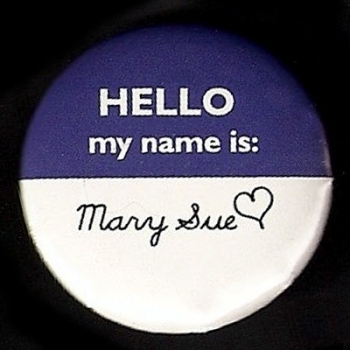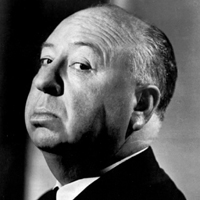FACT!: A Mary Sue/Gary Stu is a character that often shows up in literature and does very bad things to everyone involved in the reading process. Mary Sue/Gary Stu isn't their name, it's their identity.
 You can tell you are reading a Mary Sue/Gary Stu character when you come across someone who is beautiful, unique, powerful, immensely talented, loved by everyone, and has a tragic past. Her/His faults are minuscule, if she/he has them, and no one really cares about them anyway because the person is so great.
You can tell you are reading a Mary Sue/Gary Stu character when you come across someone who is beautiful, unique, powerful, immensely talented, loved by everyone, and has a tragic past. Her/His faults are minuscule, if she/he has them, and no one really cares about them anyway because the person is so great.
This is bad for literature because Mary and Gary hurt the hearts of the people. They can't relate to anyone. No one in the world is actually like that. We all kind of wish we were like that sometimes, but no one actually is, and when we come across that character, we know that we are being lied to.
Most writers tend to accidentally write them anyway, because the Mary Sue is often the person they long to be.
However, if this is you, there is help: http://www.springhole.net/quizzes/marysue.htm
THE CHALLENGE!: In 300 words describe the perfect teenager. Bonus points to whoever can use the word "effulgent" the most amount of times without growing redundant
Mary Sue/Gary Stue
Irony
Fact: Good stories always include irony.
There are many examples of this. For example, in Jurassic Park 3 (Not a good movie) when Alan Grant finally gets a hold of a phone and calls the states, the little boy that answers it is too busy watching Barney to really help them. Barney is a dinosaur. They are about to be eaten by dinosaurs. That's irony.
People are drawn to irony because they sense that they actually spend most of their lives doing something ironic themselves. Reading books with irony, when one oneself is struggling with irony is ironic. Irony gives stories a sense of realism. It also allows people to scream "Oh the irony!" Which is ironic
THE CHALLENGE!: In 300 words or less, write about an occurrence during your day. Then make this scene as ironic as possible.
Labels: irony
Suspense
FACT: Suspense is the opposite of mystery. Suspense means the audience knows everything, but the characters do not. Alfred Hitchcock is the master of this. He gave this really awesome quote once that explained suspense quite well and had to do with bombs under the table.
In a mystery, we don't know who the killer is, however we do know that the detective will actually catch him. In a suspenseful piece we not only know exactly who the killer is, we also know his hopes, his dreams, his shoe size, and where his mother went wrong. We also know that the main character is about to open the shaft door where the killer is patiently waiting with a laser gun. What we don't know is whether this killer is going to get away with his murderous intentions or if the hero happens to be wearing a disintegration proof suit.
THE CHALLENGE!: In 300 words or less write a mystery scene involving Jessica Marble, Sherlock Holmes, or the Energizer Bunny. Then in another 300 words or less, change that scene into a suspense piece.
Labels: suspense
Mystery
 When presented with a good story, a reader will develop all sorts of questions along these lines and more. It's this kind of mystery, the hooks, the turns, the tension that causes them to read on, not knowing that they are reading something mysterious and being completely jipped when it comes to charming British men.
When presented with a good story, a reader will develop all sorts of questions along these lines and more. It's this kind of mystery, the hooks, the turns, the tension that causes them to read on, not knowing that they are reading something mysterious and being completely jipped when it comes to charming British men.Labels: mystery
Make Your Readers Cry
Fact: Writers are sadists who like to make people cry about things that never even really happened.
They have many tricks. One of the trickiest is dogs. I read a book about a dog once. Two hours later. BAM! That dog was dead. I then read another book about a dog. Two hours later. BAM! That dog was dead. Then I watched a movie about a dog. BAM! It died. To top it all off there is even a movie called “All Dogs Go To Heaven,” which could be the tale of a deranged puppy killer, or a heartfelt children's cartoon depending on which critic you ask.You know who writes movies? Writers. Writers who may or may not be cats. I call this the Dead Dog Conspiracy. There was an entire book about it called No More Dead Dogs. The dog does not die in this book because it was never even alive. Instead it was burned in effigy. What does that tell you?
Labels: emotion
Creating Unsympathetic Characters
Creating unsympathetic characters are much easier than creating sympathetic ones. The key is to give great things to people who really don't deserve them, and make the people who have them think that they really do. Giving them two loving parents, and making them spoiled or a jerk is a good start. Dudley Dursley is a great example of this. If his mother was dead, no one would think the pig tail incident was funny, but because she's alive, it becomes comedic.
You can also make them rich, a businessman, a car salesman, or all three. Dialogue is very important when creating unsympathetic characters. If you end every one of their sentences with 'hon' and don't make them twisted in some way it won't work as well as if you end every one of their sentences with 'four eyes.'
If this way does not work for your story, like if you happen to be writing about the world where everyone's mother is dead, and most people are mimes, then the easiest way to make a character unsympathetic in this scenario is to have them kick a cat. This doesn't go along with the giving them things they don't deserve angle, but it's still highly effective.
How do you make your character's unsympathetic?
Creating Sympathetic Characters
To create a sympathetic character, the key is to kill someone very close to them. Preferably their mom. But only if they liked her. No one likes a character who hates their mother. Stepmother, yes. Robot nanny, definitely. But if your character hates their mother, reference creating unsympathetic characters. Even in Throw Mama from the Train, her son only sort of kind of hated her, and that made the movie acceptable.
Anyway, killing the mother or someone else really close, preferably when your character is very young is a good way to make a character more sympathetic. Physical attributes can also become sympathetic. For example, a girl with beautiful brown eyes, but a nose that is rather on the large side is much more sympathetic than her steely blue eyed perfect cheerleading counterpart. Never use the word perfect, if you want your reader to find a character sympathetic.
It's also important, if you have more than one sympathetic character to mix up the attributes that make them sympathetic. You can kill one character's mother, but you can't kill every character's mother. Unless you're writing a book about a world where everyone's mother has been killed, but then you'd need something even more sympathetic to differentiate your characters from the rest of the world, like that they have a blind father who they make soup for every day, from various wilderness shrubs.
How do you make sympathetic characters?
Characters vs Plot
Characters are the most important part of writing if you happen to be writing either the Chinese language, or a novel. If you are writing the Chinese language, the first sentence is really the only helpful one in this post, and you can go back to your Sobe and Orville Redenbacher now. If you are writing a novel, you should note that while it is never disputed that characters are the most important part of writing Chinese, it is sometimes disputed that they are the most important part of writing a novel. However, this blog does not support those people.
The characters are who the story is about. They are the human faces that give the story a voice. You can have a fantastic plot, a beautiful setting, or any other perfect written element within your work, but if your characters are no good, the story will fall flat. If the reader cannot care about your character, they cannot care about your plot. Whereas if the reader cares enough about your character, your plot becomes more forgiveable.
The Catcher and Rye is a great example of this. The plot is completely nonexistent. Everyone who studies that book knows that. However, Holden Caulfield is so interesting that no one who likes the book cares. The people who hate the book are the first to derail the plot, but you'll notice that if you really talk to them, the reason they don't like the book is because they didn't like the character.
A counter example is Heroes. Heroes had a great plot. In Season 1. The dialogue was always a bit generic, but overall the first season was very well written. The characters however, were not really strong enough to carry the series past one season. Which I think is why everything fell apart in season 2.
Does anyone else have examples/ arguments?


